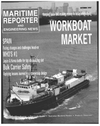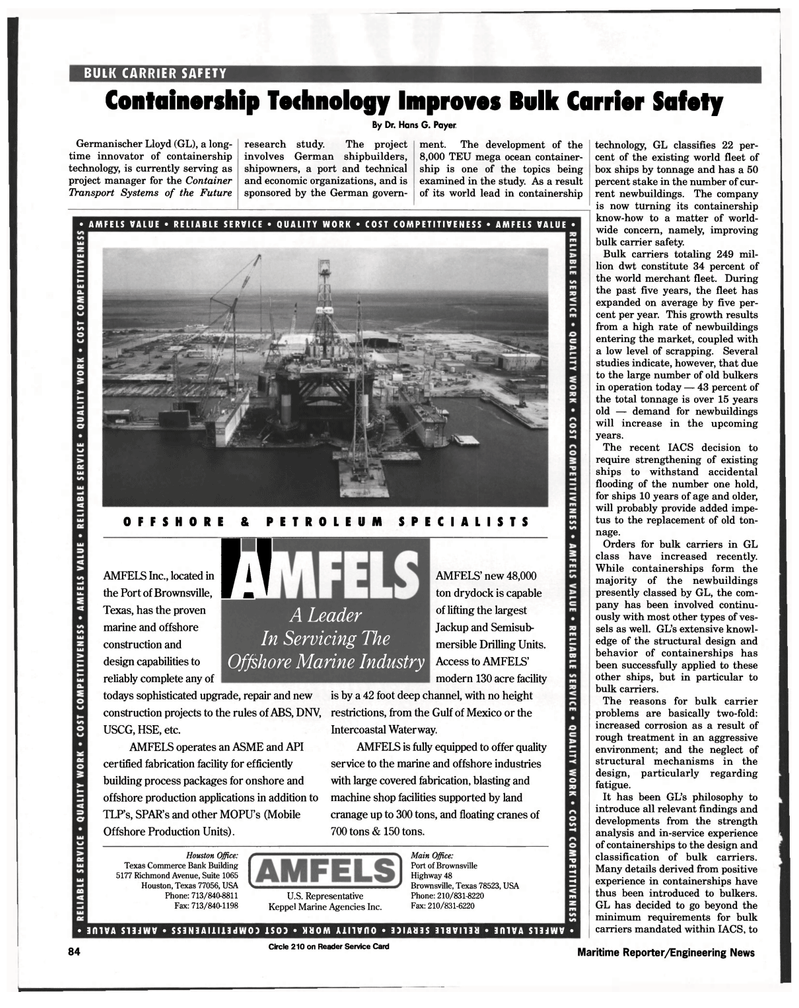
Page 74: of Maritime Reporter Magazine (October 1997)
Read this page in Pdf, Flash or Html5 edition of October 1997 Maritime Reporter Magazine
BULK CARRIER SAFETY
Containership Technology Improves Bulk Carrier Safety
By Dr. Hans G. Payer
Germanischer Lloyd (GL), a long- time innovator of containership technology, is currently serving as project manager for the Container
Transport Systems of the Future research study. The project involves German shipbuilders, shipowners, a port and technical and economic organizations, and is sponsored by the German govern- ment. The development of the 8,000 TEU mega ocean container- ship is one of the topics being examined in the study. As a result of its world lead in containership • AMFELS VALUE • RELIABLE SERVICE • QUALITY WORK • COST COMPETITIVENESS • AMFELS VALUE •
OFFSHORE & PETROLEUM SPECIALISTS
AMFELS Inc., located in the Port of Brownsville,
Texas, has the proven marine and offshore construction and design capabilities to reliably complete any of todays sophisticated upgrade, repair and new construction projects to the rules of ABS, DNV,
USCG, HSE, etc.
AMFELS operates an ASME and API certified fabrication facility for efficiently building process packages for onshore and offshore production applications in addition to
TLP's, SPAR's and other MOPU's (Mobile
Offshore Production Units). lit
A Leader
In Servicing The
Offshore Marine Industry
AMFELS'new 48,000 ton drydock is capable of lifting the largest
Jackup and Semisub- mersible Drilling Units.
Access to AMFELS' modern 130 acre facility is by a 42 foot deep channel, with no height restrictions, from the Gulf of Mexico or the
Intercoastal Waterway.
AMFELS is fully equipped to offer quality service to the marine and offshore industries with large covered fabrication, blasting and machine shop facilities supported by land cranage up to 300 tons, and floating cranes of 700 tons & 150 tons.
Houston Office:
Texas Commerce Bank Building 5177 Richmond Avenue, Suite 1065
Houston, Texas 77056, USA
Phone: 713/840-8811
Fax: 713/840-1198
U.S. Representative
Keppel Marine Agencies Inc.
Main Office:
Port of Brownsville
Highway 48
Brownsville, Texas 78523, USA
Phone: 210/831-8220
Fax: 210/831-6220 • iniVA S1UWV • SS3N3AUI13dWO) 1S03 • MHOM AlllVflO • 33IAH3S 318VI13H • 3D1VA S13JWV • technology, GL classifies 22 per- cent of the existing world fleet of box ships by tonnage and has a 50 percent stake in the number of cur- rent newbuildings. The company is now turning its containership know-how to a matter of world- wide concern, namely, improving bulk carrier safety.
Bulk carriers totaling 249 mil- lion dwt constitute 34 percent of the world merchant fleet. During the past five years, the fleet has expanded on average by five per- cent per year. This growth results from a high rate of newbuildings entering the market, coupled with a low level of scrapping. Several studies indicate, however, that due to the large number of old bulkers in operation today — 43 percent of the total tonnage is over 15 years old — demand for newbuildings will increase in the upcoming years.
The recent IACS decision to require strengthening of existing ships to withstand accidental flooding of the number one hold, for ships 10 years of age and older, will probably provide added impe- tus to the replacement of old ton- nage.
Orders for bulk carriers in GL class have increased recently.
While containerships form the majority of the newbuildings presently classed by GL, the com- pany has been involved continu- ously with most other types of ves- sels as well. GL's extensive knowl- edge of the structural design and behavior of containerships has been successfully applied to these other ships, but in particular to bulk carriers.
The reasons for bulk carrier problems are basically two-fold: increased corrosion as a result of rough treatment in an aggressive environment; and the neglect of structural mechanisms in the design, particularly regarding fatigue.
It has been GL's philosophy to introduce all relevant findings and developments from the strength analysis and in-service experience of containerships to the design and classification of bulk carriers.
Many details derived from positive experience in containerships have thus been introduced to bulkers.
GL has decided to go beyond the minimum requirements for bulk carriers mandated within IACS, to 84 Circle 210 on Reader Service Card Maritime Reporter/Engineering News

 73
73

 75
75
